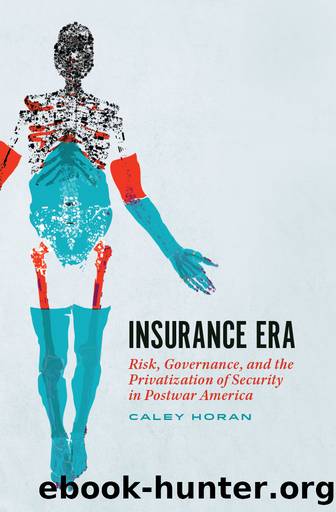Insurance Era: Risk, Governance, and the Privatization of Security in Postwar America by Caley Horan

Author:Caley Horan [Horan, Caley]
Language: eng
Format: epub
Tags: HIS000000 History / General, HIS036060 History / United States / 20th Century, BUS033000 Business & Economics / Insurance / General
Publisher: University of Chicago Press
Published: 2021-05-28T00:00:00+00:00
PART III
Defending Discrimination
5
âCommunities without Hopeâ: Urban Crisis and Insurance Redlining
Impoverished by years of disinvestment, many cities in the United States fell into disrepair and decline in the 1960s. Deeply entrenched patterns of residential segregation, combined with the flight of tax revenue, jobs, and investment capital to the suburbs, left citiesâand their primarily nonwhite residentsâwithout vital economic resources. Deteriorating conditions, discriminatory policing, and the slow pace of social and political change led to frustration and desperation in many urban communities. Tensions exploded during the middle years of the 1960s, as a wave of urban uprisings shook the nation. Between 1965 and 1967, hundreds of rebellions broke out in cities across the United States, beginning with the Watts neighborhood of Los Angeles in the summer of 1965. Violent clashes between Watts residents and police, who instigated much of the violence, lasted for five days and resulted in the deaths of thirty-four people and thousands of injuries. Newark, Detroit, and other cities followed. Over the next two years, more than two hundred uprisings broke out in thirty-five states, leading to hundreds of deaths. Horrified by the increasingly violent nature of what was commonly referred to as the âurban crisis,â Americans turned to the federal government in search of explanations and a response.
That response came in July 1967, when President Lyndon Johnson launched the National Advisory Commission on Civil Disorders and charged its members with explaining the uprisings and offering recommendations to prevent future unrest. The group, known informally as the Kerner Commission, published its findings seven months later. The report concluded that the nation was âmoving toward two societies, one black, one whiteâseparate and unequal.â Without action, it warned, the nation would fall further into a âsystem of apartheidâ and more violence would be inevitable.1 Less than a month after the reportâs release, the assassination of Dr. Martin Luther King Jr. sparked more than two hundred new uprisings in thirty-six states. Johnson, who had opted to ignore the Kerner Commissionâs findings, faced intense criticism. Under growing pressure to act, he dove into efforts to pass the Fair Housing Actâa bill designed to end racial discrimination in housing that had languished in committees for two years. Congress passed the act less than a week after Kingâs murder, securing a major victory for civil rights proponents. Johnson also moved to speed the repair of cities damaged in the uprisings, authorizing the Presidentâs National Advisory Panel on Insurance in Riot-Affected Areas, popularly known as the Hughes Panel.
Unlike the Kerner Commission, the Hughes Panel set out to address recovery from the urban uprisings, not their causes. The withdrawal of insurance companies from âriot-affectedâ neighborhoods created an obvious roadblock on the path to rebuilding, and the primary goal of the panel was to identify strategies for making insurance available to regions that had been devastated by civil unrest. Despite its focus on recovery, the Hughes investigation, once launched, made shocking discoveries surrounding the underlying causes of urban decline. The panelâs findings revealed that insurance unavailability was not simply
Download
This site does not store any files on its server. We only index and link to content provided by other sites. Please contact the content providers to delete copyright contents if any and email us, we'll remove relevant links or contents immediately.
Storytelling for dummies by Andrea Fontana(1516)
Effortless by Greg McKeown(1473)
The Practice by Seth Godin(1436)
Mastering Blockchain by Lorne Lantz(1424)
Blockchain Quick Reference by Paul Valencourt & Samanyu Chopra & Brenn Hill(1178)
Business Information Systems Workshops by Unknown(978)
The wind in the willows by Kenneth Grahame(941)
Mastering Blockchain by Lorne Lantz & Daniel Cawrey(930)
How to Lead by David M. Rubenstein(854)
The Ape in the Corner Office by Richard Conniff(817)
Handbook of Big Data Analytics by Unknown(747)
Social Media Engagement For Dummies by Aliza Sherman(735)
Getting Started with Data: The first book you should read to successfully get along with data. by Menegatti Gabriel & Team Simbiose Ventures(722)
Taking Care of Yourself (HBR Working Parents Series) by Harvard Business Review(714)
FunRetrospectives: activities and ideas for making agile retrospectives more engaging by Paulo Caroli & Tainã Caetano Coimbra(708)
Evernote for Self Publishing: How to Write Your Book in Evernote from Start to Finish by Jose John(699)
Business Storytelling For Dummies by Unknown(698)
Help! My Facebook Ads Suck-- by M. D. Cooper & Jill Cooper(682)
A Leader Listens by Ajay Banga(661)
